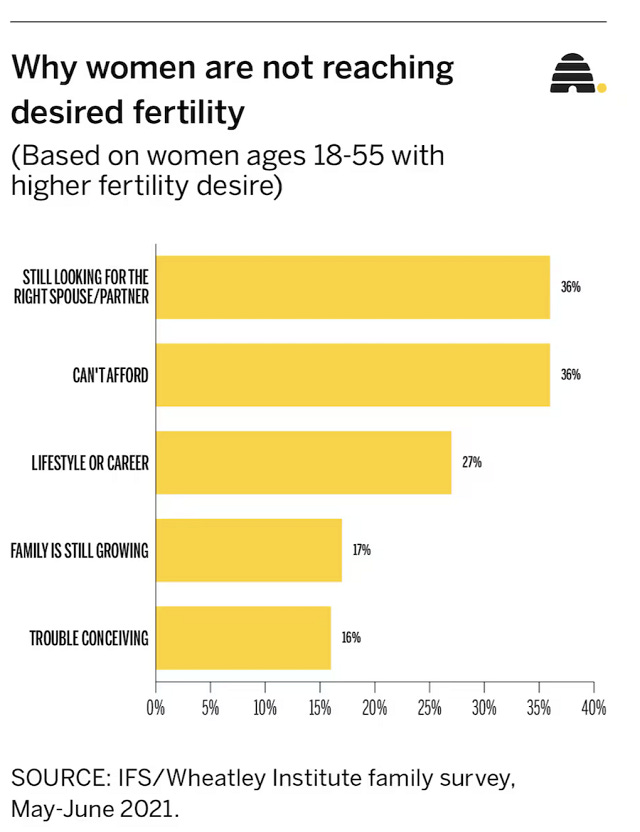The Fertility Crisis - highlights from the comments section
Well, I wouldn't call it highlights, but you know what I mean.
Intro
Thus far I have written two posts about the fertility crisis.
The first was an expression of my confusion as to what pro-natalists actually want.
The second was a consolidation of all the different opinions throughout the internet.
When I posted the second piece on reddit, people provided a number of rebuttals/arguments, which I have consolidated here.
The racism argument
This is the idea that anyone who is worried about fertility is a racist — that non-white people are out breeding white people. This is known as the Great Replacement theory in some circles.
I’m not going to indulge this argument. I have an extremely strong aversion to any sort of argument that relies on some form of “agree with me or otherwise you are racist.”
The “it’s obviously x” argument
Several of the people who read the previous list pointed to one reason or another and said “it’s obviously this one.”
It's obviously the downfall of religion and family values; it's obviously urbanization; it's obviously the culture, it's obviously house prices, it's obviously gender equality, etc.
There's nothing obvious here. As with most sociological problems, many of the factors are recursive. Many of the cultural, economic, and sociological factors are intertwined, and it’s not immediately obvious which factor serves as the initial seed.
The Matt Walsh argument
Matt Walsh is a “conservative pundit”.
In this video he frames the birth rate crisis as a moral failure, and that younger people have an obligation to continue their genetic lineage.
There's many things to say about guys like Walsh, but at least he is being honest about his views. I think a lot of people tacitly share these same views, but don't want to say it outright lest they come across as scolding or preachy. “I had it rough, and I still had kids. Suck it up, Bucko!”
Let's set aside the concept of an evolutionary leaf node, as well as the fact that the majority of men didn't reproduce throughout history. People who hold Walsh's opinion are going to have to address the asymmetry between the parent-child relationship – that parents are obligated to their children in a way that children are not obligated to their parents, by virtue of the fact that parents chose to have a child, while the child did not choose to have parents.
People might disagree with this premise, but they're going to have to do the work of explaining why.
The pension argument
One of the underlying reasons people are worried about the birth rate crisis is the fact that the pension system is running out. It’s hard to state outright, as it would require acknowledging that:
The social security system has a similar structure to an intergenerational Ponzi scheme, and
They've been rug pulled by people who don't exist.
Also, it would require people to say things like “Hey Jared, I'm kind of worried about my social security payments, can you please impregnate your wife?”
The opportunity cost argument
This is one of the variations of the “it’s obviously x” argument. These people claim that younger generations aren't having kids because they don't want to have kids.
I don't think this argument is wrong, I just think that it reframes the question. Instead of asking why people can't have kids, we just have to ask why people don't want to have kids.
There's one particular commenter that I have in mind here. The person in question said something along the lines of “whenever I asked my friends why they don't want to have kids, they go off into non sequiturs that are totally unrelated to having kids.”
I can't speak to this particular person or their friend group, but if every single person is giving them non sequiturs, then perhaps it's worth considering that they are not non sequiturs.
At the end of the day, parenting is tied to everything. It's a lifestyle, with a clear BCE and CE. If someone says “I don't want to have kids, I'm saving up for a Taylor Swift concert/I’m learning jazz/I'm studying for my masters” – that's not a non sequitur. You might consider it to be shallow, but it’s not unrelated.
Moreover, this sort of argument systematically ignores the fact that many women are openly saying that they want more kids, but are being impeded by some factor or another.

There's a blurry line where “can’t” becomes “don’t want” – but I am averse to this particular construction of argumentation, because it essentially demands we know better than the people who are claiming they can't have kids.
In other words, if you think these people are just being too picky, then say that outright.
The “I don’t know what a derivative is” argument
Some of the arguments that I observed went something like this. "Well, people didn't have much money back in the day and they still had kids” or “Well, people only had a high school education back in the day, and they still had kids.”
This argument fails to take the derivative with respect to time. If you want to argue that it's easier to be a non college educated person compared to previous generations, that's your prerogative. Similarly, when people project out into the future, they see that housing, healthcare, and higher education is going to increasingly become less affordable. Right now, the number one reason people go bankrupt is because of medical emergencies.
The “you’re just going based off of vibes” argument
Based on the most recent election, the liberal party is the political party of “the educated.” Right now they're telling me that America just elected a fascist back into office, and that this is the end of democracy. Moreover, the shift towards populism seems to be happening globally. Even one of Germany’s states just elected a far right party.
One of the biggest areas in AI research right now is figuring out how it doesn't destroy the world. And barring that, trying to figure out ways that large swaths of the economy aren't suddenly made useless.
We're at a proxy war with Russia right now; if they are pushed into a corner it's not a laughable proposition that they go nuclear. At the time of writing this they just launched an ICBM.
And then there's the good old climate catastrophe, as well as the global pandemic that we just got out of.
The point is that the vibes actually matter, and really smart people are saying the vibes are not that great right now. Pro-natalists are going to have to start making convincing arguments beyond “stop being a doomer”.
The “immigration doesn’t work” argument
has his own post regarding the fertility crisis, where he lists the reasons why immigration doesn't work. With respect to Sol, I'm not particularly convinced yet.The examples that he uses in his piece are Iraqi, Somalian and Afghani refugees moving to Finland, and illegal immigrants coming into America. His argument is that they don't reach the productive capacity needed to overcome the dearth of young workers.
I'm not sure the degree to which this generalizes to all immigration policy. Both of those scenarios seem to fall outside the boundary of regular immigration. My intuition is that the policies simply need to be adjusted such that people who enter a given country are admitted based on a) their ability to sustain high productivity work and b) the likelihood they have multiple children.
The carrying capacity argument
In the same piece, Sol argues that we are falling below the carrying capacity for homo sapiens. While I appreciate the line of reasoning, I can’t agree with the conclusion, primarily on the grounds that humans are so fundamentally different from every other species on the planet that it seems misguided to place some sort of artificial carrying capacity.
The “you clearly hate children/humanity” argument
I hate bad middle management, and the sort of language they use to disguise the fact that they’re bad. Bad middle managers don’t make decisions. They don’t have the courage to say “hey, we need you to work overtime.” They just give you 30 hours of work and 20 hours to complete it.
Similarly, pro-natalists use the same sort of language. “Guys, it’s totally cool if you don’t have kids – buuuuut here’s all these reasons the world will get objectively shittier if you don’t.”
Whatever else we might say about guys like Matt Walsh or JD Vance or Elon Musk, they at least take their arguments to its logical conclusion.
Walsh: “Have kids or you are a failure to your genetic line.”
Vance: “Have kids or or we will make fun of you for being a childless cat lady."
Musk: “Have kids so that we have a higher GDP than China.”
We have solutions, but nobody likes them
The truth is, there are many ways to solve the fertility crisis, it’s just that they unpalatable, as it would require sacrifices from non trivial swaths of the existing population.
We can make houses more affordable for young people, but that means we need to lower the “asset value” for existing property owners.
We can make intergenerational family houses the norm, but that means undoing the last several decades where we made fun of people for “living at home.”
We can start adopting the values of high fertility cultures, such as Israel or the Mormons, but that means taking a hit to our GDP.
We can move back to an agrarian society, but that’s another hit to our GDP.
We can convince people that the future is going to be bright, and that it’s actually a great time to have kids, but that means convincing people that worries about AI risk, climate catastrophe, crumbling infrastructure, nuclear wars, and future pandemics are just overblown.
We can create a robust social safety net where people who get fired or have a medical emergency aren’t worried they will be completely ruined, but that means creating a society where we pretend to care about poor people.
We can make child care more affordable, but that means creating a society where we pretend to care about children.
We can convince women that it’s better to be a stay at home mom than a worker in the economy, but that’s going to be very difficult to do without coming across as completely regressive.
We can convince men that it’s better to be a stay at home dad than a worker in the economy, but that means valuing men beyond their bank account.
We can take away women’s bodily autonomy — which, well, let’s check back in 2028.
Conclusion
Again, I don’t expect anybody to be convinced of anything here.
The people who already agree with me are going to see everything written here as obvious, and the people who don't are going to scold me for not having a growth mindset — and then go on to provide no tangible solutions.




Great post Ron.
The most important question is why people want to have kids. Historically there have been many answers but right now the only answer remaining is because they want the parenting experience.
Most women do become mothers even in low fertility countries like South Korea and get to enjoy motherhood.
The problem is that 1 kid is enough to experience parenthood but to maintain population levels you need a TFR of 2.1 meaning you need most families to have 2 kids and many families with 3 kids not only to move the average above 2 but also to compensate for the childless. I don't see that happening.